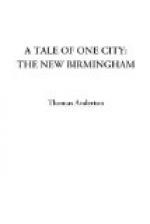Mr. Chamberlain has a pointed, slightly upturned nose,
and some cynical people may be disposed to say that
it has become more pointed and sharp the more he has
poked it into political business. Anyway, it is
a characteristic, perhaps
the characteristic,
of Mr. Chamberlain’s face, and the skilful
Vanity
Fair artist caught it after a time, and just sufficiently
exaggerated it to make a genuine caricature. Seeing,
however, that Mr. Chamberlain was born to be a much-pictured
man, one thing has stood him in fine stead—his
eye-glass. When “Mr. Punch” first
took him in hand he could make little or nothing of
him, but the eye-glass saved the Fleet Street artists
from failure. They found nothing they could lay
hold of at first, not even his nose. They saw
a man with a pleasant, good-looking, closely-shaven
face, some dark hair brushed back from his forehead,
but there was nothing they could hit off with success,
and the only way they could secure identity was by
the eye-glass. “Mr. Punch” used at
one time to represent Mr. Bright as wearing an eye-glass,
but I don’t think he ever used one. Certainly
I never saw Mr. Bright with an eye-glass, and never
saw Mr. Chamberlain without one. Great and prominent
men should have some characteristic peculiarity that
should be their own special personal brand, and if
they have it not, it must be made for them—as
in the case of Lord Palmerston and the wisp of straw
that “Mr. Punch” always put in his mouth.
Mr. Chamberlain, however, has kindly obliged, and
given caricaturists and others something by which
he can be unmistakably “featured.”
V.
Exit Mr. Chamberlain.
In 1876 Mr. Chamberlain was elected a member of Parliament
for Birmingham, and his municipal career shortly came
to an end. It may be remembered that he made
an unsuccessful attempt to represent Sheffield some
little time before he aspired to become a candidate
for Birmingham. He made a very plucky fight in
the cutler constituency, and the Sheffield blades
were hardly so sharp as they might have been in rejecting
such an able and rising politician. Probably,
if they could have peered a little into the future,
Mr. Chamberlain’s first seat in Parliament would
not have been as a representative of Birmingham.
Mr. Chamberlain, however, was elected as one of the
members of his adopted town in the year mentioned,
and, as I have said, he retired more or less from
municipal life. It may further be said that he
relinquished his local position at the right moment.
He was lucky as to the time in which he took up public
life in Birmingham, and he was equally fortunate in
regard to the period at which he quitted it. He
had set afloat great local schemes, he had laboured
assiduously for the good of the town, he had attained
the acme of his local popularity, he was admired even
by his opponents, and an imposing memorial was erected
in his honour. After this, anything that might
have happened would have been in the nature of an
anti-climax so far as his local career was concerned.




